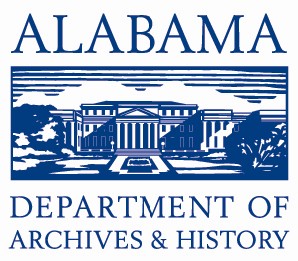from Apr. 17, 1865
Edwin Stanton to William Tecumseh Sherman
-
Full Title
Edwin Stanton to William Tecumseh Sherman
-
Description
A letter from Secretary of War, Edwin Stanton, to General William Tecumseh Sherman detailing the assassination of Lincoln and the attack on Seward.
-
Transcription
^[[$100]]
The following dispatch was received by Gen’l Sherman from Sec’y Sherman. [[?]] is furnished for the information of Brig’d Gen’l E.W. Rice.
“President Lincoln was murdered at 10-o’clock last night in the private box at Ford’s Theatre in this city by an assassin who shot him through the head with a pistol ball. About the same time the Seward’s house was entered by another assassin, who stabbed the secretary ^[[in]] several places, but it is thought he may possibly recover; but his son Fred will probably die of wounds received from the assassin. The assassin of the President, leapt from the box, brandishing a dagger, exclaiming “Sic semper tyrannis” and that “Virginia was revenged”. Mr. Lincoln fell senseless from his seat and continued in that state until 22 after 1’ o clock, at which time he breathed his last. Gen’l Grant was published to be at the theatre, but he did not go. Vice President Johnson now becomes President and will take the oath of office and assume the duties today. I have no time to add more except to say that I find evidence that an assassin is also on your track and I beseech you to be more heedful than Mr. Lincoln was of such knowledge.
(over)
(Sgd.) Edwin Stanton
Sec'y of War
Washington April 17 - 17 D.C.
By order of Brevet Major General Jas. M. Corse
L.H. Everts
Asst. Adjt. Genl.
[transcription by Alli Hartley-Kong] -
Source
Special Collections Research Center, University of Chicago Library
-
Rights
This item is in the public domain and may be reproduced and used for any purpose, including research, teaching, private study, publication, broadcast or commercial use, with proper citation and attribution.
-
Tags
-
Cite this Item
Edwin Stanton. "Edwin Stanton to William Tecumseh Sherman". Remembering Lincoln. Web. Accessed June 28, 2025. https://rememberinglincoln.fords.org/node/1182
-
Creator
Edwin Stanton
-
Date
April 17, 1865
from Apr. 17, 1865
Edwin Stanton to William Tecumseh Sherman
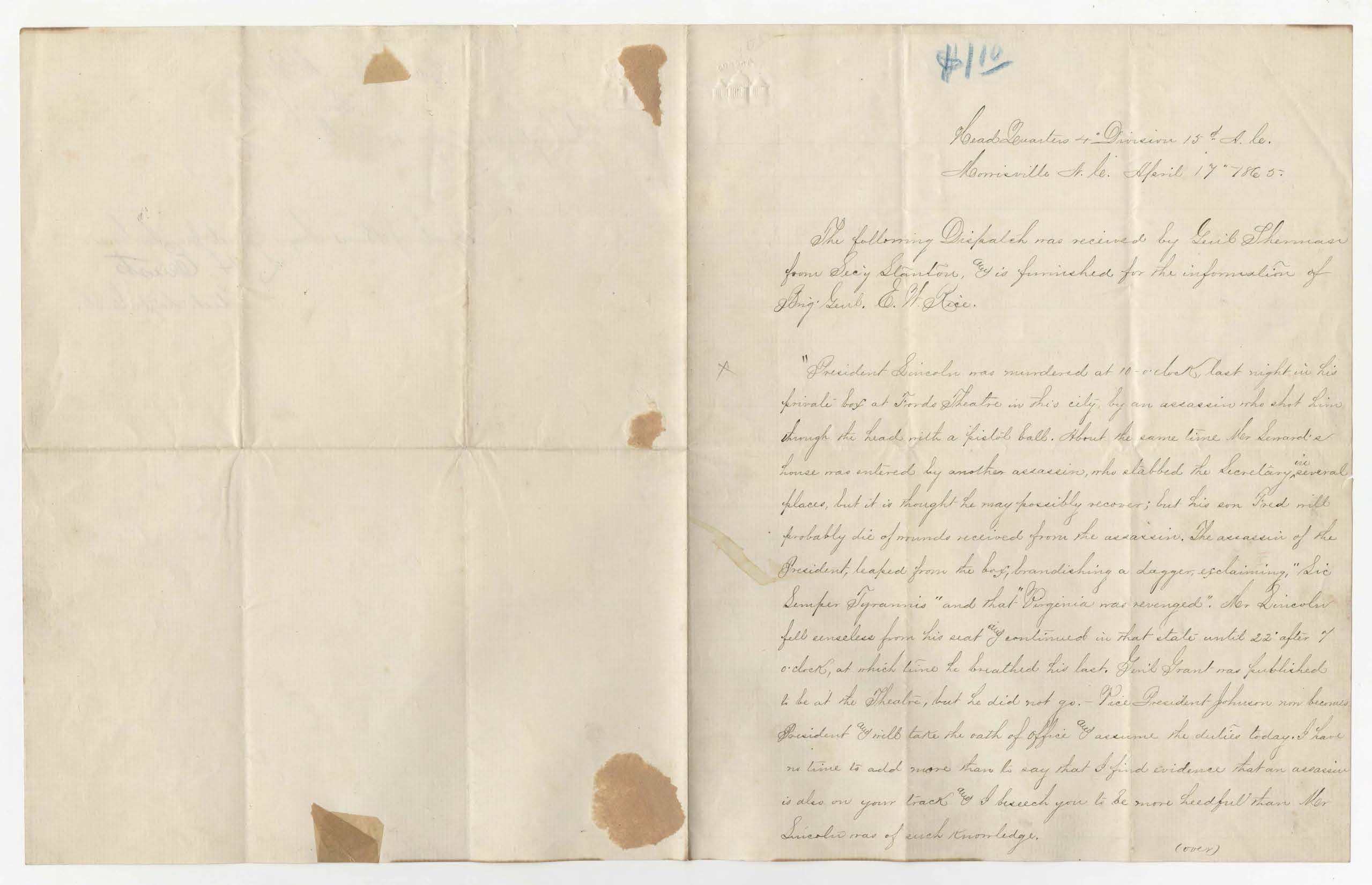
-
Description
A letter from Secretary of War, Edwin Stanton, to General William Tecumseh Sherman detailing the assassination of Lincoln and the attack on Seward.
-
Source
Special Collections Research Center, University of Chicago Library
-
Rights
This item is in the public domain and may be reproduced and used for any purpose, including research, teaching, private study, publication, broadcast or commercial use, with proper citation and attribution.
-
Creator
Edwin Stanton
-
Date
April 17, 1865
from May. 1, 1865
Theory. Practice. Effect.
-
Full Title
Theory. Practice. Effect.
-
Description
This print attributes John Wilkes Booth's assassination of Abraham Lincoln to the influence of the Knights of the Golden Circle, the proslavery secret society. The first panel labels "Theory" as George W. L. Bickley, the "Head of the Knights of the Golden Circle," standing in for the society's ideology. Under "practice" is John Wilkes Booth with a dagger behind his back with the "Effect" being the death of President Lincoln.
-
Source
Library of Congress, Prints and Photographs Division, LC-DIG-pga-13665
-
Rights
This item is in the public domain and may be reproduced and used for any purpose, including research, teaching, private study, publication, broadcast or commercial use, with proper citation and attribution.
-
Tags
-
Cite this Item
unknown. "Theory. Practice. Effect.". Remembering Lincoln. Web. Accessed June 28, 2025. https://rememberinglincoln.fords.org/node/1156
-
Creator
unknown
-
Date
1865
-
Material
wove paper and wood engraving
-
Dimensions
14 x 29.2 cm
from May. 1, 1865
Theory. Practice. Effect.
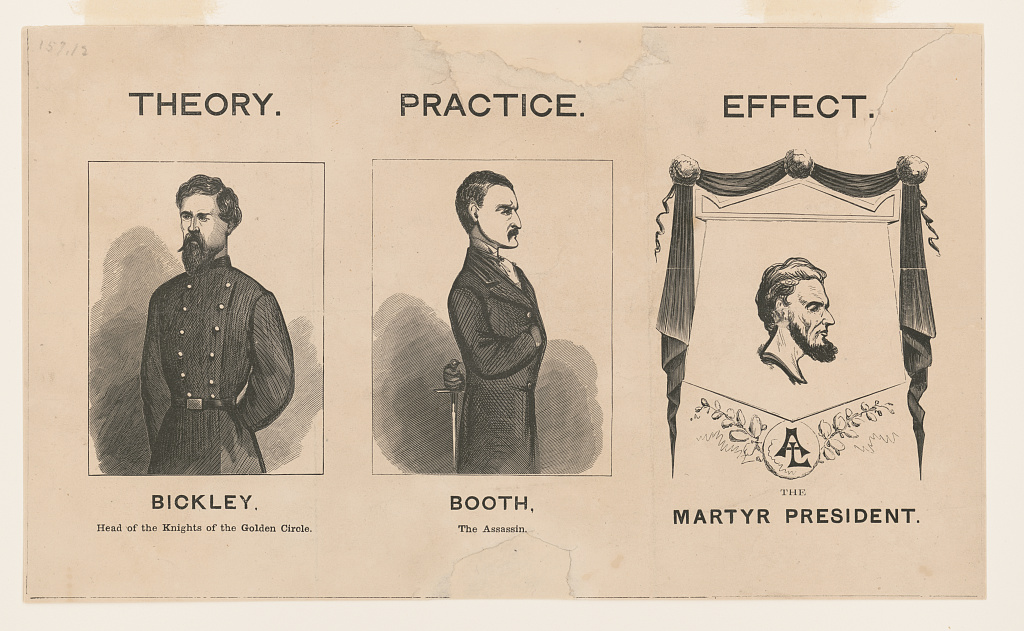
-
Description
This print attributes John Wilkes Booth's assassination of Abraham Lincoln to the influence of the Knights of the Golden Circle, the proslavery secret society. The first panel labels "Theory" as George W. L. Bickley, the "Head of the Knights of the Golden Circle," standing in for the society's ideology. Under "practice" is John Wilkes Booth with a dagger behind his back with the "Effect" being the death of President Lincoln.
-
Source
Library of Congress, Prints and Photographs Division, LC-DIG-pga-13665
-
Rights
This item is in the public domain and may be reproduced and used for any purpose, including research, teaching, private study, publication, broadcast or commercial use, with proper citation and attribution.
-
Creator
unknown
-
Date
May 1, 1865
-
Material
wove paper and wood engraving
-
Dimensions
14 x 29.2 cm
from Sep. 1, 2015
James L. Lucas Recollection
-
Full Title
The Burial of John Wilkes Booth and Trial of the Lincoln Conspirators
-
Description
This manuscript was typed by Paul S. Lucas from James Lucas' narration. In the manuscript, James Lucas describes the American political scene in the 1850's and the coming of the Civil War. He gives an eyewitness account of Washington in the war years, including a description of Lincoln in great detail. Lucas spent three years with the 12th Veteran Reserve Corps, who served as guards for the Old Capitol Prison, where the Lincoln conspirators were held. Lucas also served as a court messenger during the prisoners' trial, and he describes the conspirators as well as the trial itself. In addition, Lucas tells of guarding the body of John Wilkes Booth on the monitor "Montauk" and of the secret burial of the assassin's body in the Old Capitol prison.
-
Source
c.00086 - James L. Lucas Manuscript
-
Rights
Educational use only, no other permissions given. Copyright to this resource is held by Michigan State University and is provided here for educational purposes only. It may not be reproduced or distributed in any format without written permission of the University Archives & Historical Collections, Michigan State University.
-
Tags
-
Cite this Item
As Told by James L. Lucas to Paul S. Lucas. "The Burial of John Wilkes Booth and Trial of the Lincoln Conspirators". Michigan State University Archives & Historical Collections. Remembering Lincoln. Web. Accessed June 28, 2025. https://rememberinglincoln.fords.org/node/855
-
Creator
As Told by James L. Lucas to Paul S. Lucas
-
Publisher
Michigan State University Archives & Historical Collections
-
Date
date unknown
-
Material
Typed on Paper
-
Dimensions
8" x 11"
from Sep. 1, 2015
The Burial of John Wilkes Booth and Trial of the Lincoln Conspirators
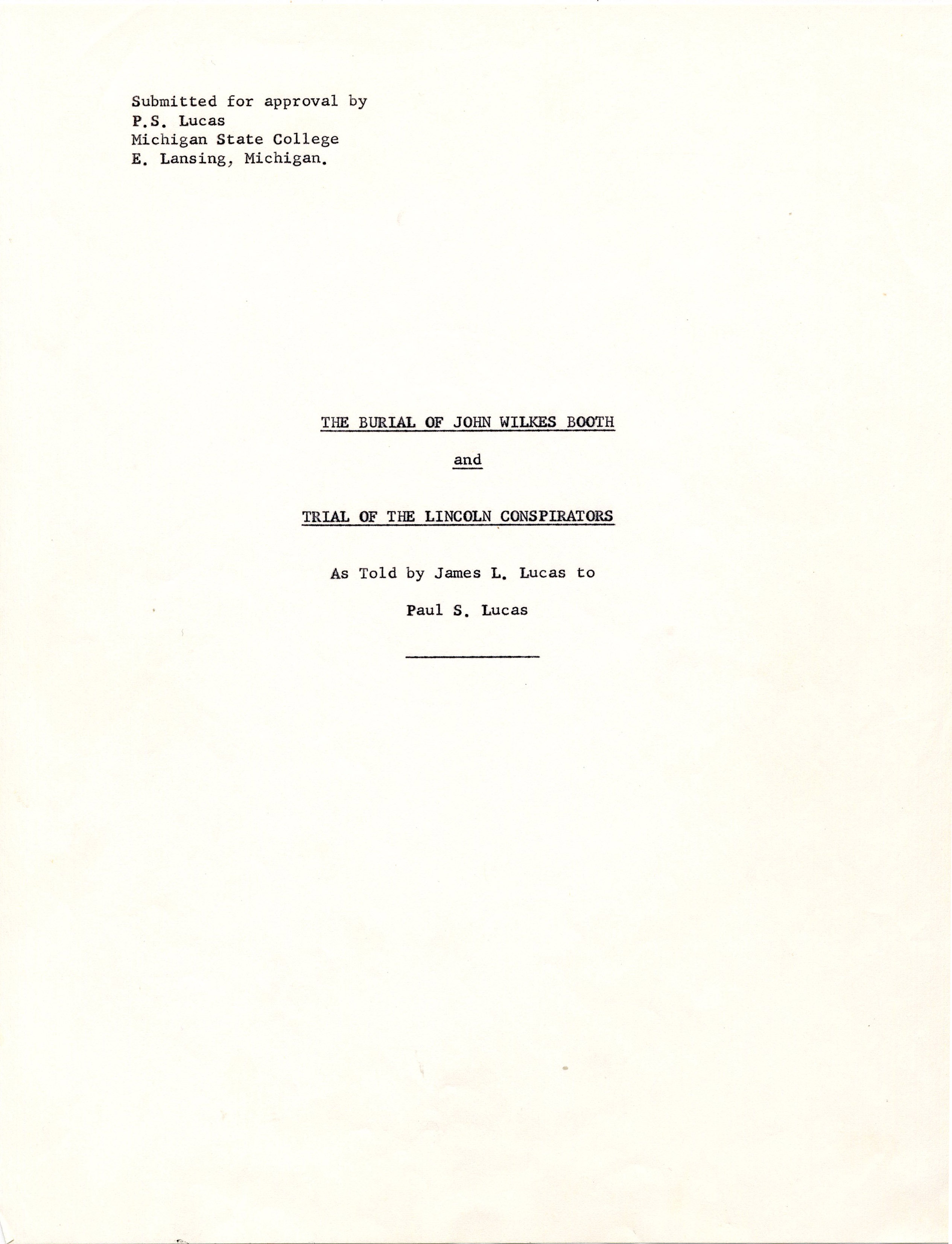
-
Description
This manuscript was typed by Paul S. Lucas from James Lucas' narration. In the manuscript, James Lucas describes the American political scene in the 1850's and the coming of the Civil War. He gives an eyewitness account of Washington in the war years, including a description of Lincoln in great detail. Lucas spent three years with the 12th Veteran Reserve Corps, who served as guards for the Old Capitol Prison, where the Lincoln conspirators were held. Lucas also served as a court messenger during the prisoners' trial, and he describes the conspirators as well as the trial itself. In addition, Lucas tells of guarding the body of John Wilkes Booth on the monitor "Montauk" and of the secret burial of the assassin's body in the Old Capitol prison.
-
Source
c.00086 - James L. Lucas Manuscript
-
Rights
Educational use only, no other permissions given. Copyright to this resource is held by Michigan State University and is provided here for educational purposes only. It may not be reproduced or distributed in any format without written permission of the University Archives & Historical Collections, Michigan State University.
-
Creator
As Told by James L. Lucas to Paul S. Lucas
-
Publisher
Michigan State University Archives & Historical Collections
-
Date
September 1, 2015
-
Material
Typed on Paper
-
Dimensions
8" x 11"
from Apr. 23, 1865
Letter to John Yarick from Reuben Yarick, April 23, 1865
-
Full Title
Handwritten Letter to John Yarick from his brother, Reuben Yarick, April 23, 1865
-
Description
Handwritten letter from Reuben Yarick, at Washington, D.C., to his brother, John Yarick, in Suffield, Portage County, Ohio. The letter describes Reuben's fears and feelings about the assassination of President Lincoln and visiting his body in the White House. This letter is part of Papers of John Yarick, 1854-1864. Reuben enlisted in Company G, 1st Michigan Infantry as a Sergeant on July 2, 1861 at Jackson (Mich.) age 25. He was wounded in action in 1864 and hospitalized at the U.S. Hospital, Hampton, Virginia. He was discharged from Company B, 24th VRC at Washington, D.C., on July 28, 1865. (This information is from Reuben's service record.)
-
Transcription
Page One
Washington, D. C., Aprl 23, 1865
Ever Dear Brother
Yours of the 16th is before
me and I am happy indeed to hear that
you are getting well again and your
family is recovering from its affliction
John I wrote a letter to you I think [inserted: two weeks ago]
that you have received it before this
time but I will write you a short
letter this evening yes John President
Lincoln is dead and you and [crossed out illegible words]
his remains are on it[sic] way to its last
resting place in the far west Springfield
Illinois they left here at eight -oclock
this [crossed out] yesterday morning I seen his
boddy [sic] at the White House last tuesday
or Wedensday [sic] it was conveyed to the
Capital the crowd of People was great the
procession was large and on thurday [sic]
his boddy [sic] lay in State at the Capital [sic]
and an emence [sic] swarm of People was
Page Two
their [sic] all day to get a last glimpse
of the once famous ruler of these
United States and our unhappy country
I went on Guard yesterday morning
at the old capital Prison and came
off this morning in the Prison nothing
but Rebel Prisoners of war are
confined and mostley [sic] all Rebell [sic]
officers from Second Lieutenant
to Generals and what little
opportunity that I had to speak to
them they all felt sorry and sayed [sic]
that to their opinion that the best
man for peace had gone and
did not think that the so called
Confederate Government had eneything [sic]
to do with the assassination and
was afraid that we would use them
pretty ruff [sic] we have allays [sic] used
prisoners of war well and I thing [sic]
that we allways [sic] will as long as they
will behave themselves two hundred
of these was sent off this morning
Page Three
for Johnson Island Ohio one Gen
was with the lot Gen Payn was
his name those two hundred was
all Officers.
Well John I don't know that i have
much more to write this time
their [sic] is a rumor now that the
V.R.C. will be mustard [sic] out soon
and if they do I will get out of the
Service but if the war continues
I will get in the Cavlrey [sic] if I can
I have one good arm yet and I can
fight it out had thought to quit
when I got out but this last cowardly
murder is enough to arouse evrey [sic]
Patriot's heart and fight as long as
he can raise an arm
Hoping that this will finde [sic] you
all well as it leaves me I will close
for this time my health is good at
present Remain as ever your
Devoted Brother
Sergt. Reuben Yarick
-
Source
Clarke Historical Library, Central Michigan University, John Yarick Papers, 1854-1864
-
Rights
This item may be reproduced and used for any purpose, including research, teaching, private study, publication, broadcast or commercial use, with proper citation and attribution.
-
Tags
-
Cite this Item
Yarick, Reuben. "Handwritten Letter to John Yarick from his brother, Reuben Yarick, April 23, 1865". Remembering Lincoln. Web. Accessed June 28, 2025. https://rememberinglincoln.fords.org/node/847
-
Creator
Yarick, Reuben
-
Date
1865
-
Material
Letter
-
Dimensions
8x10 inches
from Apr. 23, 1865
Handwritten Letter to John Yarick from his brother, Reuben Yarick, April 23, 1865
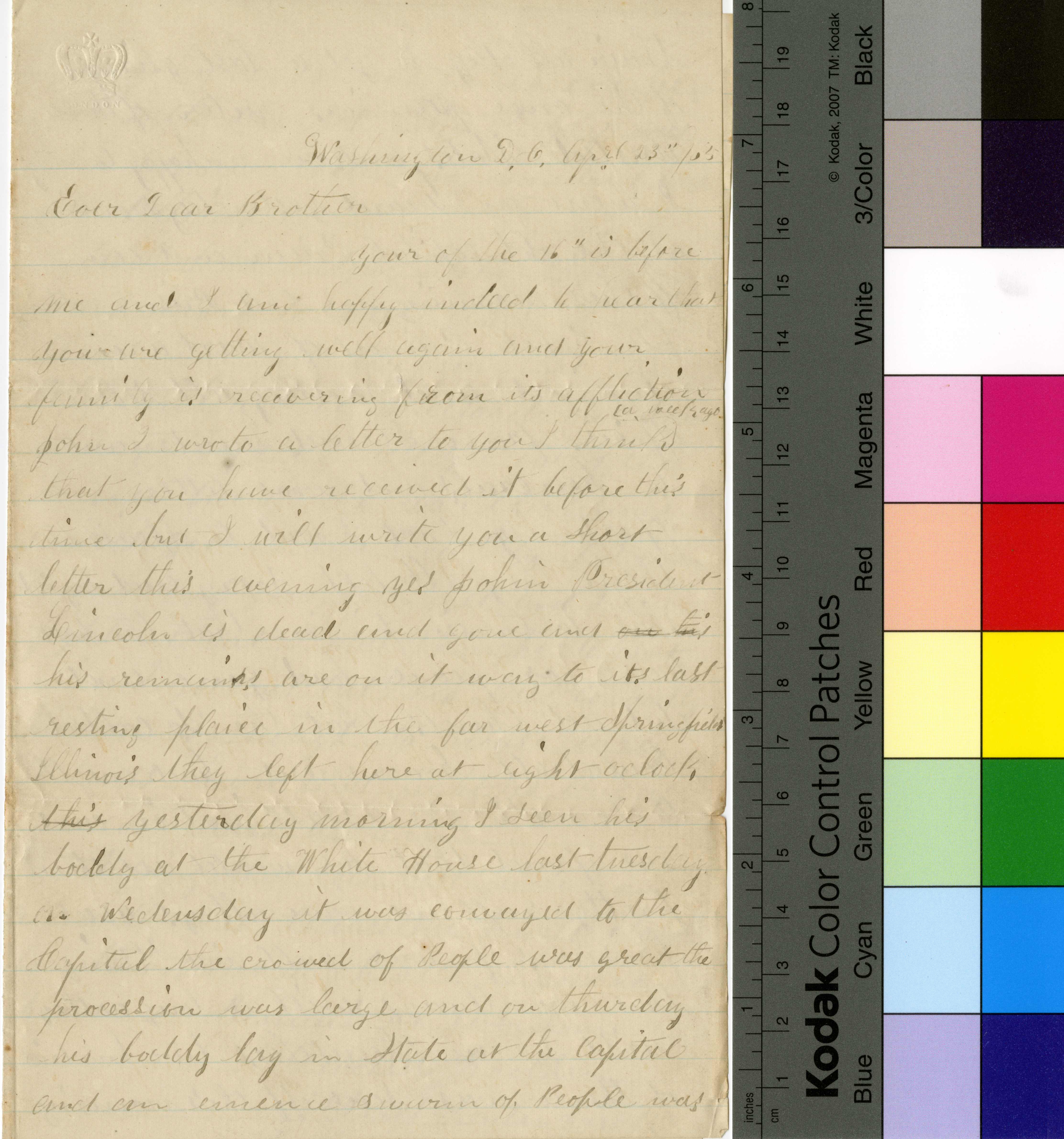
-
Description
Handwritten letter from Reuben Yarick, at Washington, D.C., to his brother, John Yarick, in Suffield, Portage County, Ohio. The letter describes Reuben's fears and feelings about the assassination of President Lincoln and visiting his body in the White House. This letter is part of Papers of John Yarick, 1854-1864. Reuben enlisted in Company G, 1st Michigan Infantry as a Sergeant on July 2, 1861 at Jackson (Mich.) age 25. He was wounded in action in 1864 and hospitalized at the U.S. Hospital, Hampton, Virginia. He was discharged from Company B, 24th VRC at Washington, D.C., on July 28, 1865. (This information is from Reuben's service record.)
-
Source
Clarke Historical Library, Central Michigan University, John Yarick Papers, 1854-1864
-
Rights
This item may be reproduced and used for any purpose, including research, teaching, private study, publication, broadcast or commercial use, with proper citation and attribution.
-
Creator
Yarick, Reuben
-
Date
April 23, 1865
-
Material
Letter
-
Dimensions
8x10 inches
from Sep. 18, 1866
Wilkes Booth and his Dead Body
-
Full Title
Wilkes Booth and his Dead Body [From the Cincinnati Union of Sunday]
-
Description
News article with details of what happened to the body of John Wilkes Booth.
-
Transcription
Wilkes Booth and his Dead Body. -
[From the Cincinnati Union of Sunday}
The Louisville Courier has the following:
“Wilkes Booth, whose body Secretary Stanton took so much pains to dispose of, so that no man should ever know the spot where it was buried, is reported to be in Europe. The story is that the man who ‘Boston Corbett’ so heroically shot, and whose body Stanton refused to exhibit to any one that ever saw Booth, was a poor wretch hired by the assassins to personate Booth, in order to facilitate the escape of the latter. Whether there be or be not any truth in this story, it will never cease to be a suspicious circumstance connected with the fate of Wilkes Booth, that Stan-ton refused to deliver the body that was brought up from Virginia to his friends or even to let them look upon it.”
Dating a couple of months from the time that Booth, the assassin of President Lincoln, was shot and killed by Boston Corbett, in the attempt to capture him, sensation stories like the above have been of frequent occurrence. Of course there is not a shadow of truth in the tale of Booth being still alive. The body was fully recognized as being that of Booth, and although tales were told about it be-ing secretly taken out to sea and sunk, and others about it being buried at mid-night, in an obscure place, by two men employed by Government, and who were sworn to secrecy, yet facts, known to but few, and carefully kept from the newspa-per press, show that the body was given over to the relatives of Booth, and that it was buried in either New England or in Canada.
The facts, as we had them at the time on authority not to be doubted, are as follows:
A few days before the body of Booth so mysteriously disappeared, our informant, a resident of New York, and favorably known as a dramatic writer, was called upon after bank hours to cash the draft of an undertaker, a near neighbor, who stated that he had received an order from the Booth family, to repair to Washington with a coffin, and there to receive the body of John Wilkes Booth, which would be surrendered to him on their order, and to convey it North for burial. The under-taker said he would return, and pass through New York, en route with the body, on a Thursday evening, or on Friday morning of the same week.
The morning after the undertaker left Washington, the report came by telegraph that the body had mysteriously disappear-ed—that it had been secretly buried—one report said in an old field, another in the Penitentiary yard, and still another that it had been taken to sea and sunk.
The undertaker did not return to his family until some days had elapsed. He came from the North, but declined to give any information relative to the place where John Wilkes Booth, under another name, had been buried. Should it get out, he said, the grave would be violated and the body removed, and the family were naturally anxious that this should not be.
These facts coming to us from the source they did, are more than sufficient to convince us, not only of the death of John Wilkes Booth, but that his body, with a pledge of secrecy freely given and fully kept, was given over to his family for burial, and that, except the relatives of Booth and the undertaker, no living being knows where the last remains of John Wilkes Booth are interred. No slab marks the last resting place of the assas-sin. The man who dug the grave knew not for whom it was intended, and in the burial permit was inserted a false name. In his unknown grave the assassin will lie until the grave gives up its sheeted dead, and all are called to judgement.
[Transcription by Alicia B., Ford's Theatre Society.] -
Source
Springer Collection, Oakland University Special Collections
-
Rights
This item may be reproduced and used for any purpose, including research, teaching, private study, publication, broadcast, or commercial use, with proper citation and attribution.
-
Tags
-
Cite this Item
Louisville Courier. "Wilkes Booth and his Dead Body [From the Cincinnati Union of Sunday]". Louisville Courier. Remembering Lincoln. Web. Accessed June 28, 2025. https://rememberinglincoln.fords.org/node/806
from Sep. 18, 1866
Wilkes Booth and his Dead Body [From the Cincinnati Union of Sunday]
![Wilkes Booth and his Dead Body [From the Cincinnati Union of Sunday]](https://rememberinglincoln.fords.org/sites/default/files/Remembering%20Lincoln_021.jpg)
-
Description
News article with details of what happened to the body of John Wilkes Booth.
-
Source
Springer Collection, Oakland University Special Collections
-
Rights
This item may be reproduced and used for any purpose, including research, teaching, private study, publication, broadcast, or commercial use, with proper citation and attribution.
-
Creator
Louisville Courier
-
Publisher
Louisville Courier
-
Date
September 18, 1866
-
Material
newspaper
from Apr. 19, 1865
"Death of President Lincoln"
-
Full Title
"Death of President Lincoln"
-
Description
An account of the death of Abraham Lincoln, which includes a suspicion that the assassination was part of a "political plot."
-
Rights
This item is in the public domain and may be reproduced and used for any purpose, including research, teaching, private study, publication, broadcast or commercial use, with proper citation and attribution.
-
Tags
-
Cite this Item
Brownlow's Knoxville Whig. ""Death of President Lincoln"". Remembering Lincoln. Web. Accessed June 28, 2025. https://rememberinglincoln.fords.org/node/452
-
Creator
Brownlow's Knoxville Whig
-
Date
April 19, 1865
from Apr. 19, 1865
"Death of President Lincoln"
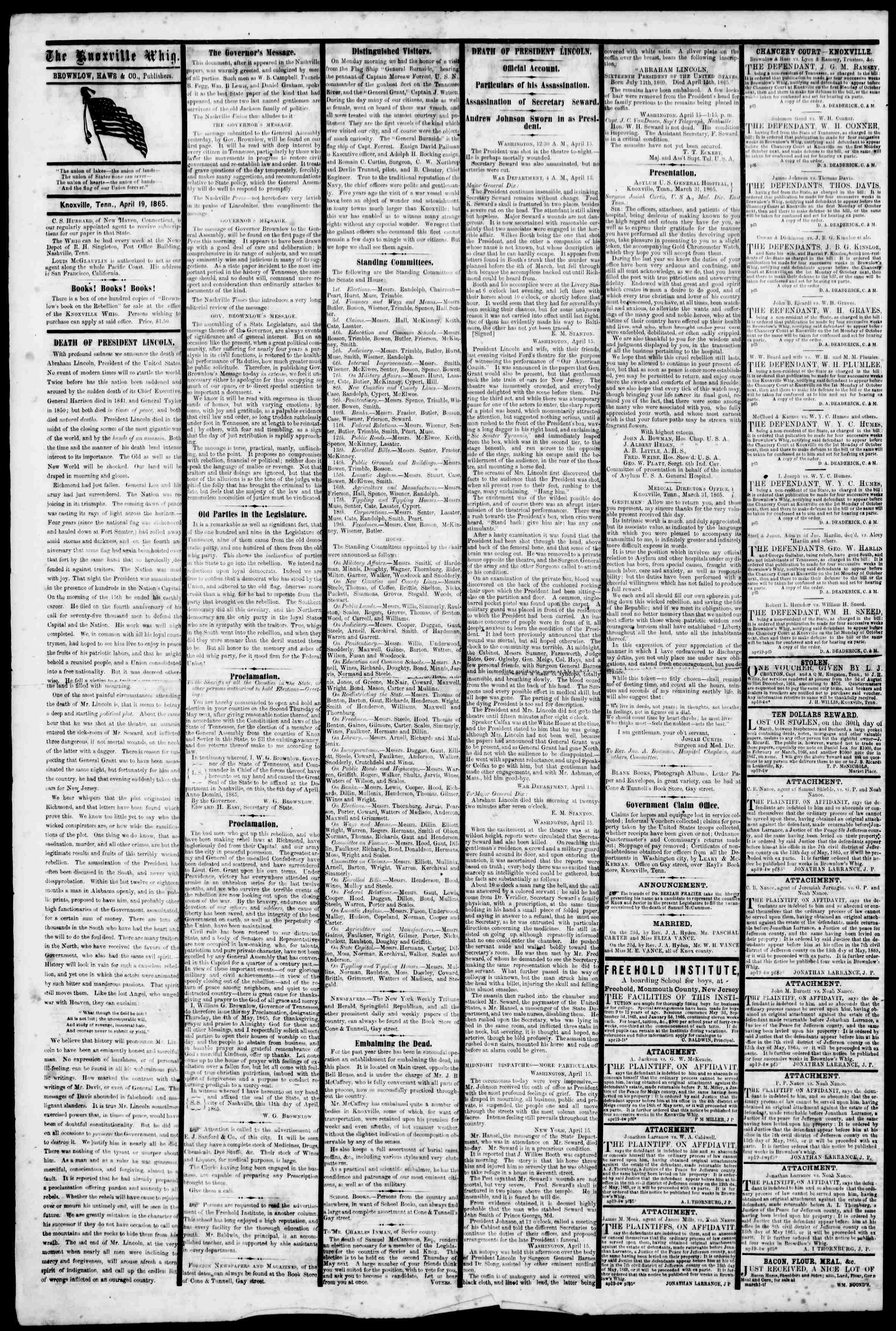
-
Description
An account of the death of Abraham Lincoln, which includes a suspicion that the assassination was part of a "political plot."
-
Rights
This item is in the public domain and may be reproduced and used for any purpose, including research, teaching, private study, publication, broadcast or commercial use, with proper citation and attribution.
-
Creator
Brownlow's Knoxville Whig
-
Date
April 19, 1865
from Sep. 28, 1865
"The Great Crimes of the 'Democracy'"
-
Full Title
"The Great Crimes of the 'Democracy'"
-
Description
This article details the wrongs committed by the Confederacy and the Democratic Party, including the assassination of Lincoln.
-
Rights
This item is in the public domain and may be reproduced and used for any purpose, including research, teaching, private study, publication, broadcast or commercial use, with proper citation and attribution.
-
Tags
-
Cite this Item
Beltmont Chronicle. ""The Great Crimes of the 'Democracy'"". Remembering Lincoln. Web. Accessed June 28, 2025. https://rememberinglincoln.fords.org/node/451
-
Creator
Beltmont Chronicle
-
Date
September 28, 1865
from Sep. 28, 1865
"The Great Crimes of the 'Democracy'"

-
Description
This article details the wrongs committed by the Confederacy and the Democratic Party, including the assassination of Lincoln.
-
Rights
This item is in the public domain and may be reproduced and used for any purpose, including research, teaching, private study, publication, broadcast or commercial use, with proper citation and attribution.
-
Creator
Beltmont Chronicle
-
Date
September 28, 1865
from May. 8, 1865
Editorial commenting on a rumor that "the assassination of Mr. Lincoln was planned in Canada and approved in Richmond."
-
Full Title
Editorial commenting on a rumor that "the assassination of Mr. Lincoln was planned in Canada and approved in Richmond."
-
Description
Though reluctant to believe that members of the Confederate government were involved, the author of the piece is very critical of their leadership (a "nest of conspirators that ruled this unfortunate section with the iron rod of despotism"). He also suggests that "Union men of the South...are far more deeply interested" in the president's death. Published in the Montgomery Daily Mail on May 8.
-
Source
Excerpt from the Montgomery Daily Mail, item number LN.1507. Catalog record for this title is available here.
-
Rights
Use of this item for research, teaching and private study is permitted with proper citation and attribution, as defined here. Reproduction of this item for publication, broadcast or commercial use requires written permission. For permission, please contact the Alabama Department of Archives and History.
-
Tags
-
Cite this Item
Montgomery Daily Mail. "Editorial commenting on a rumor that "the assassination of Mr. Lincoln was planned in Canada and approved in Richmond."". Remembering Lincoln. Web. Accessed June 28, 2025. https://rememberinglincoln.fords.org/node/203
from May. 8, 1865
Editorial commenting on a rumor that "the assassination of Mr. Lincoln was planned in Canada and approved in Richmond."
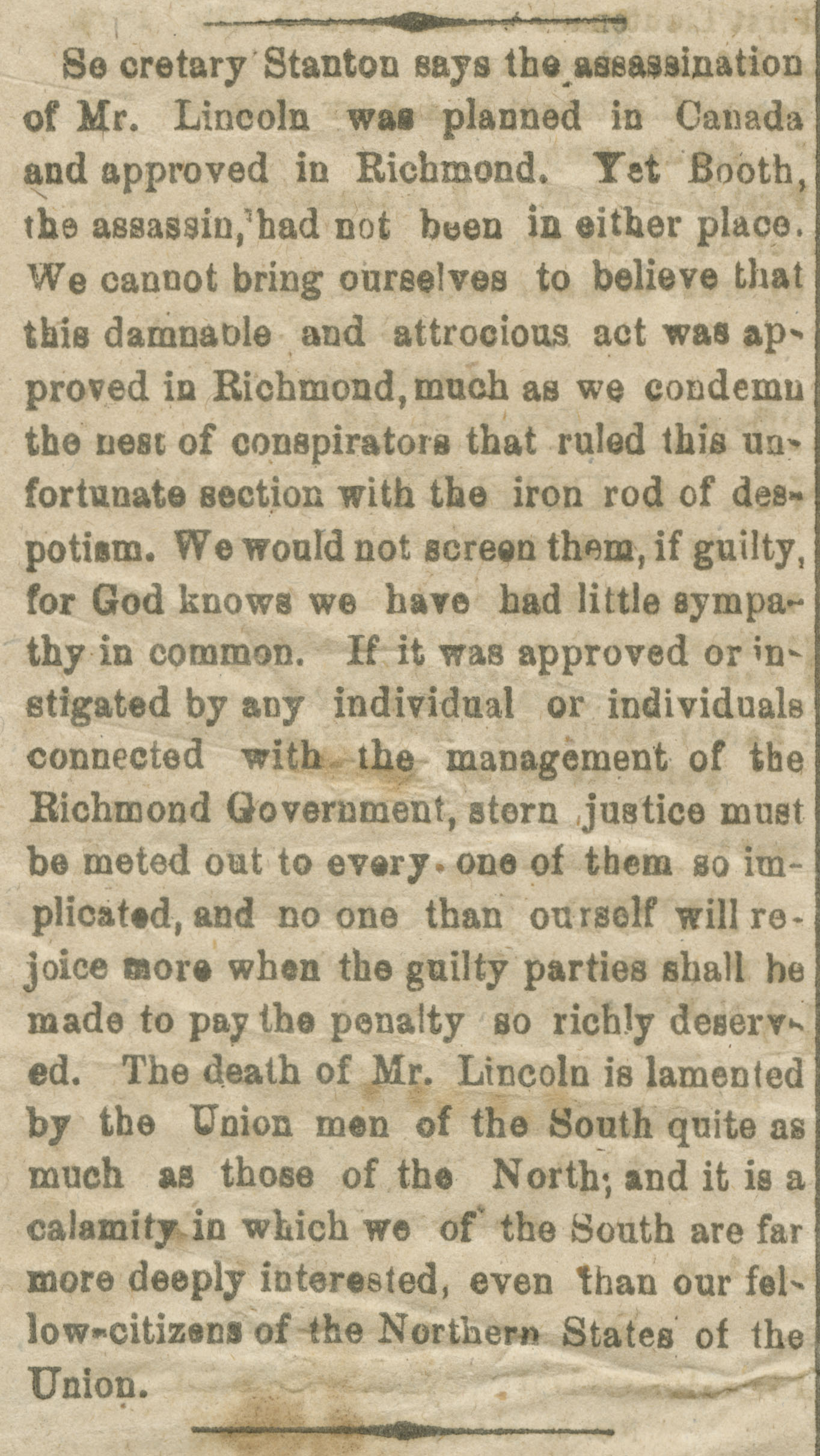
-
Description
Though reluctant to believe that members of the Confederate government were involved, the author of the piece is very critical of their leadership (a "nest of conspirators that ruled this unfortunate section with the iron rod of despotism"). He also suggests that "Union men of the South...are far more deeply interested" in the president's death. Published in the Montgomery Daily Mail on May 8.
-
Source
Excerpt from the Montgomery Daily Mail, item number LN.1507. Catalog record for this title is available here.
-
Rights
Use of this item for research, teaching and private study is permitted with proper citation and attribution, as defined here. Reproduction of this item for publication, broadcast or commercial use requires written permission. For permission, please contact the Alabama Department of Archives and History.
-
Creator
Montgomery Daily Mail
-
Date
May 8, 1865
from May. 8, 1865
"Shall a Lenient Policy Be Continued?"
-
Full Title
"Important Correspondence. Shall a Lenient Policy Be Continued?"
-
Description
Correspondence regarding a proposed policy of leniency toward citizens of Mississippi who wish to cooperate with the federal government. In the first letter, Brigadier General J. W. Davidson expresses concern that the strategy will not be adopted in light of the president's assassination. In the second letter, Major General Napoleon J. T. Dana restates his support of lenient treatment of the former rebels: "Even though contrary to my expectations, the rebel leaders in high position should ultimately be found to be implicated in the diabolical assassination of the President, I have no idea that the masses of the people or the subordinate officers will entertain any other feeling than that of utter abhorrence at the deed." The correspondence was originally published in the Vicksburg Herald on April 25, 1865, and it was reprinted in the Montgomery Daily Mail on May 8.
-
Source
Excerpt from the Montgomery Daily Mail, item number LN.1507. Catalog record for this title is available here.
-
Rights
Use of this item for research, teaching and private study is permitted with proper citation and attribution, as defined here. Reproduction of this item for publication, broadcast or commercial use requires written permission. For permission, please contact the Alabama Department of Archives and History.
-
Tags
-
Cite this Item
Montgomery Daily Mail. ""Important Correspondence. Shall a Lenient Policy Be Continued?"". Remembering Lincoln. Web. Accessed June 28, 2025. https://rememberinglincoln.fords.org/node/204
from May. 8, 1865
"Important Correspondence. Shall a Lenient Policy Be Continued?"

-
Description
Correspondence regarding a proposed policy of leniency toward citizens of Mississippi who wish to cooperate with the federal government. In the first letter, Brigadier General J. W. Davidson expresses concern that the strategy will not be adopted in light of the president's assassination. In the second letter, Major General Napoleon J. T. Dana restates his support of lenient treatment of the former rebels: "Even though contrary to my expectations, the rebel leaders in high position should ultimately be found to be implicated in the diabolical assassination of the President, I have no idea that the masses of the people or the subordinate officers will entertain any other feeling than that of utter abhorrence at the deed." The correspondence was originally published in the Vicksburg Herald on April 25, 1865, and it was reprinted in the Montgomery Daily Mail on May 8.
-
Source
Excerpt from the Montgomery Daily Mail, item number LN.1507. Catalog record for this title is available here.
-
Rights
Use of this item for research, teaching and private study is permitted with proper citation and attribution, as defined here. Reproduction of this item for publication, broadcast or commercial use requires written permission. For permission, please contact the Alabama Department of Archives and History.
-
Creator
Montgomery Daily Mail
-
Date
May 8, 1865

